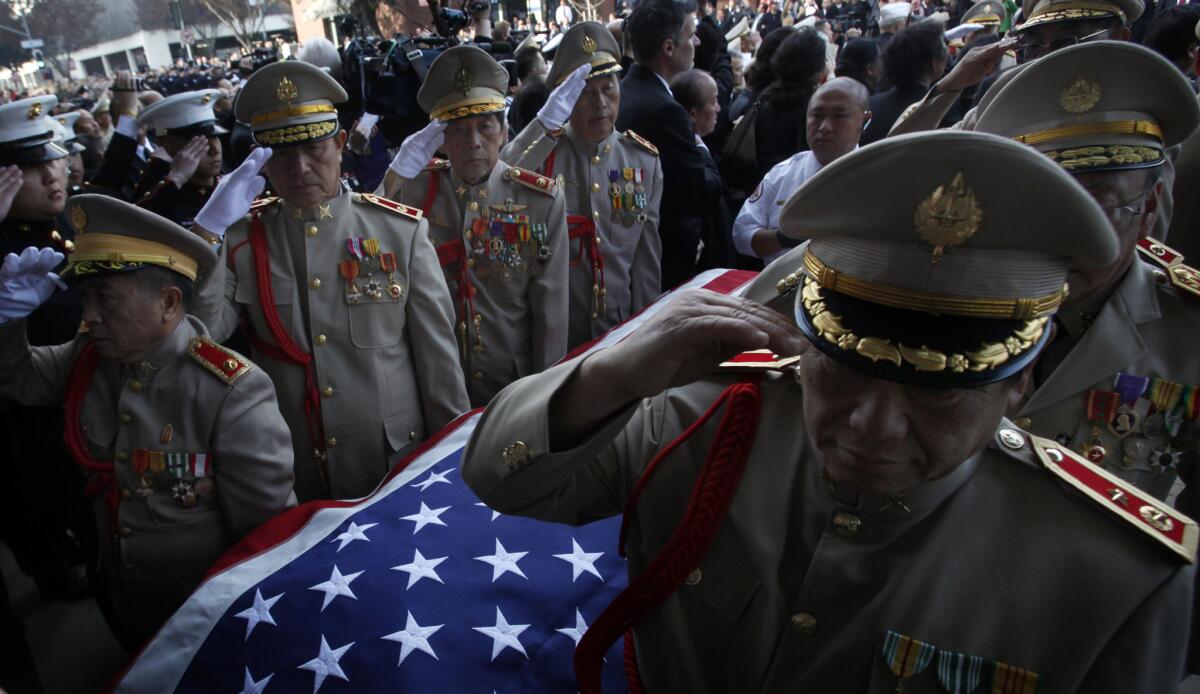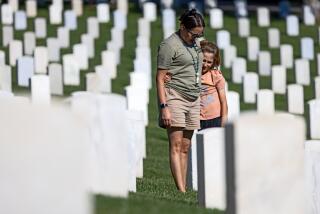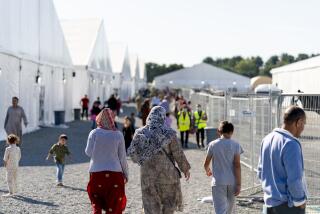Hmong vets suffer setback in quest for burial at U.S. cemeteries

WASHINGTON â For years, they have sought to heal what they call a lingering wound from the Vietnam War era.
Hmong veterans â who fought in the CIA-backed secret war in Laos in the 1960s and â70s â have tried to obtain the right to be buried in U.S. veterans cemeteries. Such burials, they say, would be the appropriate way to recognize their wartime service.
But just when it appeared that former Hmong fighters might get their wish, election-year politics dealt them a setback. A veterans bill that would have advanced their cause was derailed in the Senate on Thursday in a partisan fight over unrelated issues.
âOh, no!ââ said Philip Smith, Washington director of Lao Veterans of America, when he heard the news. âEach month that passes, more of the veterans are passing away without the benefit of being honored.â
Col. Wangyee Vang, president of the Fresno-based Lao Veteran Institute of America, vowed to continue the fight with visits to congressional offices when he comes to Washington in May for a wreath-laying ceremony at the Lao Veterans of America Monument at Arlington National Cemetery.
âOur veterans will continue to work on it,â Vang said.
The legislation became a priority after the military denied permission for Gen. Vang Pao, a Hmong leader who died in California in 2011, to be buried at Arlington because he and the soldiers who fought under him did not directly serve in the American military. He was buried at Forest Lawn Memorial Park in Glendale.
Legislation has been proposed to open national cemeteries to the estimated 6,200 to 8,200 Lao and Hmong who fought in the war and are U.S. citizens or legal residents. But it has languished.
So when the thick Senate veterans bill included a few lines to require the departments of Defense and Veterans Affairs to issue a report on âthe extent to which Laotian military forces provided combat support to the Armed Forces of the United States between February 28, 1961, and May 15, 1975,ââ the veterans saw it as a step forward.
While veterans legislation is usually popular, the bill was blocked on a largely party-line vote, with Republicans complaining that the Democratic-drafted measure cost too much and that they were denied a vote on new sanctions against Iran.
âItâs a major setback,â Smith said. âItâs very sad that weâre a casualty of the deadlock in Washington.ââ
The effort to open the cemeteries to the former Hmong fighters, nonetheless, enjoys bipartisan support.
Sen. Lisa Murkowski, a Republican from Alaska, where about 5,000 Hmong live, has championed the cause in the Senate. Large numbers of Hmong also reside in Minnesota and Wisconsin. In the House, Rep. Jim Costa (D-Fresno) has introduced the âHmong Veteransâ Service Recognition Act.â Many of the veterans live in Californiaâs Central Valley.
Smith, in testimony before a Senate committee last year, called the legislation âAmericaâs unfinished business.ââ
In 2000, President Bill Clinton signed legislation easing U.S. citizenship requirements for Hmong immigrants who fought in the secret war.
Proponents of the legislation to grant former Hmong fighters the right to be buried in national cemeteries point out that Clinton in 2000 also signed legislation making Philippine World War II veterans who fought under the U.S. flag eligible for burial in VA cemeteries.
Follow LATimes National on Facebook
Twitter: @richardsimon11
More to Read
Sign up for Essential California
The most important California stories and recommendations in your inbox every morning.
You may occasionally receive promotional content from the Los Angeles Times.











